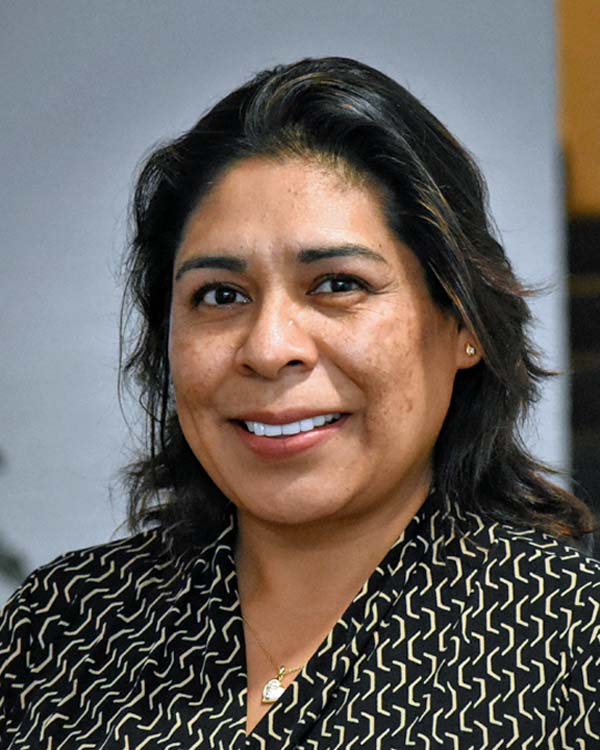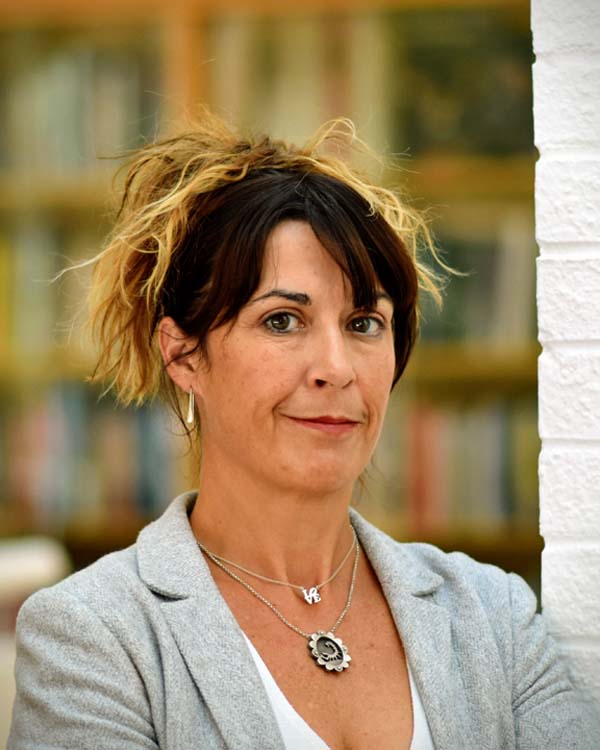In this issue we highlight the research of three Fellows from the 2021–22 class, all of whom are part of the Center’s ongoing initiative to support research by scholars from Historically Black Colleges and Universities.

Jacqueline Álvarez-Rosales
Associate Professor of Hispanic Studies, Spelman College
Tony Frazier
Associate Professor of History, North Carolina Central University
Elizabeth S. Manley
Associate and Kellogg Endowed Professor of History, Xavier University of Louisiana
Jacqueline Álvarez-Rosales
Project: Discourses around the African Diaspora in Bolivia: From the Colonial Period to the Dawn of the National Life
Jacqueline Álvarez-Rosales is associate professor of Spanish and former chair of the department of World Languages and Cultures at Spelman College. She is also a member of the Honors and the African Diaspora and the World programs.
Originally from Bolivia, Dr. Álvarez-Rosales studied journalism at the Universidad Mayor Real y Pontificia de San Francisco Xavier de Chuquisaca. She received her MA and PhD from the University of Nebraska-Lincoln and Vanderbilt University, respectively. She is currently working on a manuscript tentatively entitled Discourses around the African Diaspora in Bolivia: From the Colonial Period to the Dawn of the National Life. Her project, focused on the cultural manifestations and identity of Afro-descendants in Bolivia, analyzes letters, accounts, poetry, plays, and novels.

What was the initial spark that led you to this project? What are the big questions that you are considering?
While growing up in Bolivia I observed the similarities and yet the uniqueness of different cultures. I recall my visits to the rural countryside, the dance of la saya, and the Afro-Bolivian women wearing polleras. These experiences sparked my initial interest in interculturality and syncretism. I later observed the commonalities between the Indigenous and Afro-Bolivians, and invariably how both populations were negatively portrayed in literature and history under the colonial and national discourse (this despite centuries of interaction among groups). This imagery construction occupied my initial work.
My current work deals with discourses around the Afro-Bolivian population in different periods, spanning the colonial to the dawn of the republic in the early nineteenth century. I also observe the interaction between the Afro and Indigenous populations and how this interaction is portrayed. I consider different questions, among them: Is it possible to approach the study of both communities using Indigenous (Aymara and Quechua) and African cosmovision and epistemologies in addition to (or probably a part of) the umbrella theories of subalternity or postcoloniality? What will such an approach reveal? Are natural elements such as the mother earth (Pachamama) and other vital concepts in native cosmology important in the reading of the African diaspora in the Andes?
In the course of your research have you run across anything that genuinely surprised you? What can you tell us about it?
It surprises me the amount of research produced to strengthening certain discourses such as the Western, White, imperial, or other discourses of power. I understand, though, the many and different purposes of writing and how discourses are constructed to sustain power. I believe it is necessary to appeal to other types of discourses and epistemologies that question and challenge the structure of power, its foundation, the institutions that support it, and that offer a fair and more complete way to see the world and to approach cultures. The work of Bolivian sociologist Silvia Rivera Cusicanqui and the ch’ixi concept on mestizaje are important in this regard.
During the course of my research, it surprises me also how narratives of power have silenced the voice of the Black population in Bolivia and in Latin America in general and have minimized or distorted its presence and contributions. At the same time, it surprises me to see how, regardless of the silencing and erasure, the Black population managed to contest, to revert discourses, to culturally survive and, as anachronic as it seems, to “decolonize on the go,” or resist, during the colonial period. In other words, both, the Indigenous and Black populations continuously confronted the colonial discourse through cultural and social practices.
What new avenues of inquiry do you hope this research will prompt or make possible in your field?
Academics in my field use different theories to approach texts, among them umbrella theories such as postcolonial theory and subalternity. Colonialism and coloniality define all former colonies around the world that struggle and continue struggling with the effects of colonialism and imperialism. However, aside from the common experiences of former colonies, there are geographical differences—the Caribbean or the Andes, for example, and within the Andes, the highlands, and the coast—but also cultural and historical. For instance, the existence of former empires prior to the Spanish arrival, different native groups, cosmovision, epistemologies, visual and oral histories, social organization, and approaches to elements such as land, time, and social relations, to mention some.
My hope through this research is to attempt a theoretical approach to the study of the Afro Andes. (If a definition of an Afro-Andean is even possible). Also, to review if the common experience of being colonized influenced the intersection of African and Indigenous cosmologies and epistemologies. I hope to approach the Afro-Bolivian communities within their own context. I believe that departing from cultural concepts and the Andean cosmovision can lead us to recognize active and contesting subjects, and to no longer see both groups as passive and voiceless.
Tony Frazier
Project: Slaves Without Wages: Runaway Black Slaves and Servants in Eighteenth-Century London
Tony Frazier is associate professor of history at North Carolina Central University. His research covers the social and legal history of Blacks in eighteenth-century Great Britain, Atlantic slavery and emancipation, and African American history. Frazier’s current project, Slaves Without Wages: Runaway Black Slaves and Servants in Eighteenth-Century London (Peter Lang Press Oxford), examines how slavery ended in eighteenth-century Great Britain.
He has published articles on Black British history in the eighteenth century around race and representation in English plays, art, and riots. He is currently completing an article on the memory of Nat Turner in the 1930s amongst the Black left. At North Carolina Central University, he regularly teaches courses in European history, African diaspora, African American history, and world history. He recently completed a summer fellowship at the Digital Ethnic Studies Institute at the University of Nebraska-Lincoln working on a digital project about the 1839 Amistad revolt.

What was the initial spark that led you to this project? What are the big questions that you are considering?
This project began in an African Presence in Europe graduate course. Some scholars of slavery tend to see the 1772 Somerset Case as central to the history of slavery—as the moment when slavery ended in England. My study interrogates the ways in which our understanding of the end of slavery often makes law (both judges and abolitionists) the key players in the end of slavery. That focus not only obscures how slavery continued to exist after the 1772 Somerset case, but also the agency of enslaved people in their own self-emancipation.
In the course of your research have you run across anything that genuinely surprised you? What can you tell us about it?
Finding an individual runaway in a newspaper advertisement and discovering their baptism in the parish records. This indicates to me enslaved runaways possibly asserting new identities after baptism.
What new avenues of inquiry do you hope this research will prompt or make possible in your field?
As scholars, we must not allow accepted historical narratives to stifle archival voices. This research will expand our understanding about the institution of slavery as part of the African Diaspora in Europe.
Elizabeth S. Manley
Project: Imagining the Tropics: Women, Tourism, and Caribbean Island Fantasy, 1890–1980
Elizabeth S. Manley is a Kellogg Endowed Associate Professor of History at Xavier University of Louisiana. She is the author of The Paradox of Paternalism: Women and Authoritarian Politics in the Dominican Republic and coauthor of the collection of feminist writings Cien Años de Feminismos Dominicanos with Ginetta Candelario and April Mayes. She has published articles in The Americas, The Journal of Women’s History, Caribbean Studies, and Small Axe and is a contributing editor (Modern History Dominican Republic) for the Library of Congress’ Handbook of Latin American Studies.
Her new project, tentatively titled Imagining the Tropics: Women, Tourism, and Caribbean Island Fantasy, 1890–1980, looks at the role of women in the development of twentieth-century Caribbean tourism. She has received funding for the project from the the American Philosophical Society, the Pan American Airways Foundation, and the National Endowment for the Humanities.

What was the initial spark that led you to this project? What are the big questions that you are considering?
My current project began over fifteen years ago while conducting research in the Dominican Republic. While I knew that sex tourism dominated many of the country’s beach enclaves, I became fascinated and repelled by the version in which Global North women ventured to the region—either explicitly or “accidentally”—for romance, love, and sex. The more I looked, the more I saw male operators on nearly every beach corner, and I was intrigued and somewhat baffled by their clearly Jamaican-inflected English, their encyclopedic knowledge of Bob Marley lyrics, their fit physiques, and, frequently, their dread-locked hair. For me, the big question that kept digging at me was how exactly did the development of tourism allow for the flourishing of such a region-wide phenomenon. In simpler terms, I wanted to find the historical groundings of how, precisely, Stella had gotten Her Groove Back.
In the course of your research have you run across anything that genuinely surprised you? What can you tell us about it?
While not necessarily a surprise to me as an historian of women and gender, I am constantly amazed at the consistent presence of women behind the scenes in the drama of tourism development. While I expected to see women running travel agencies, serving as flight attendants, or representing tourism ministries as beauty pageant winners, it was much more of a thrill to realize that they had been the foundations of the industry since the turn of the century. Whether that was writing sophisticated travelogues and social science treatise, running hotels and welcome committees, or building travel-based empires, women like Ethel Hart, Erna Fergusson, Helen Lowe Auble, and Sintra Berrington Bronte all demonstrate the ways in which the bedrock of the tourist trade—physical and imaginary, positive and negative—has been built on their labor of care.
What new avenues of inquiry do you hope this research will prompt or make possible in your field?
It is a widespread phenomenon that we think of the Caribbean as a place of relaxation, escape, and resetting. And yet we often fail to interrogate the underlying problems with seeing a place only for its value to the Global North tourist. This is not far from the idea of thinking about the “Big Easy” or believing that “What Happens in Vegas Stays in Vegas.” It is my hope that this research pushes readers to question those entrenched tropes, and to learn something about where they come from. I also hope that this work can push for more scholarship that takes a pan-Caribbean lens and seeks to understand the nuanced, complicated, and fascinating connective tissue that runs through the region.
